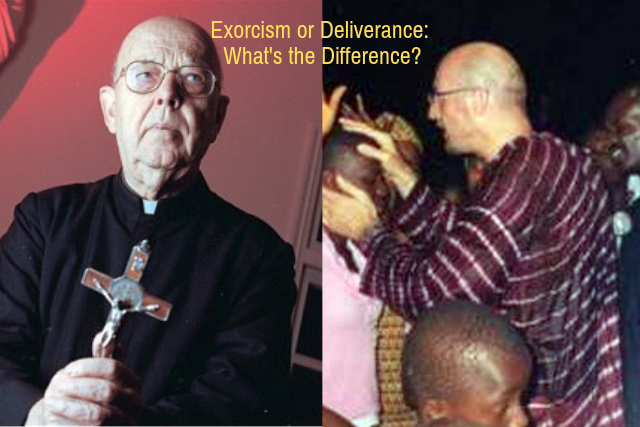When conversing with counseling clients, we use the term “deliverance ministry” in discussions. They will often ask about exorcisms. Exorcism or deliverance: what’s the distinction?
Like so many of my generation, I was intrigued by the original “The Exorcist” movie back in 1972 and attended a screening. It was not a wise choice. I was not a Christian at the time and had no biblical understanding of the demonic realm.
The movie highlighted, in vivid Hollywood detail, tribulations of a harried Catholic priest trying to wage warfare again a demon in a young girl. I remember feeling fearful as I watched it, and it wasn’t until 13 years later, when I became born-again, that God began to bring light into the darkness for me.
Over the year, It was comforting to learn that demons just can’t jump on people and that we, as believers, have power and authority over them!
Exorcism Uses Rituals
Wikipedia distinguishes between the terms exorcism and deliverance as follows: “Exorcisms are carried out through the use of various rituals of exorcism, such as the Roman Ritual, and often utilize attendant sacramentals such as holy water, while deliverance involves the ongoing counseling of the individual through various programs.” (Emphasis added).
I believe this succinctly addresses it: exorcism involves rituals while deliverance focuses on a program (or process). The Catholic Church has a very structured regimen for training exorcists and equipping priests to perform exorcisms. The Catholics see an increased need in their Church for this type of ministry and training centers are being raised up.
Deliverance ministers use a variety of different approaches/programs, ranging from flamboyant ministry at the altar to quieter sessions in a private location.
Other sources want to define exorcism as calling out demons from those who are demon-possessed while deliverance is for everyone else. We think that the distinction does not bring clarity and raises more questions than it answers.
As deliverance ministers, we too see an increased awareness and recognition of the need for the ministry of driving out of demons and that it is for Christians also!
At Above & Beyond, we define deliverance as simply the driving out of demons. We address other aspects of deliverance in other articles (“Christians cannot be demon-possessed” and “How Do You Do Deliverance”) and on our website. There are a variety of approaches to doing deliverance, but the general absence of rituals and implements distinguishes it from exorcism.
We do use anointing oil on our hands when we minister deliverance as we see that the directive in James xxx. We do not use so-called holy water. We do not place bibles on people’s heads. Our approach, when the client is properly prepared, is to look into their eyes (the windows to the soul) and call out demons using the process the Lord has shown us. We also believe that all motivated and trained believers can minister in deliverance; it is not the exclusive realm of paid clergy or religious superstars.
Demonic movies successfully impart fear into many who watch them; that is the point! We should not fear the demonic realm, but I would never watch a movie that seeks to glorify or empower our spiritual enemies! God’s people perish for lack of knowledge (Hosea 4:6) and widespread ignorance about deliverance and effective spiritual warfare contribute to the destruction.
We encourage people to use the term “deliverance.” The term “exorcism” typically drags in unwanted and inaccurate informational baggage that brings more confusion than clarity. In Mark 16:17, Jesus promised that one of the signs to follow believers was the driving out of demons. Let’s call it deliverance and leave it at that!

 Get all of our popular videos, podcasts, presentations, and guides in one place.
Get all of our popular videos, podcasts, presentations, and guides in one place.
Hey, I have been staying up with your site and still haven’t had a chance to talk with our Pastor. I do have an appointment with him on Thursday 7/24 and will get his input on your position of the spiritual realm. I personally feel like I am not in a position to battle Satan and start provoking him without my Pastor. I think your Deliverance will open a world I can’t handle without support. I can let you know how it went after our meeting. Good luck with your message, God Bless you, Thomas : )